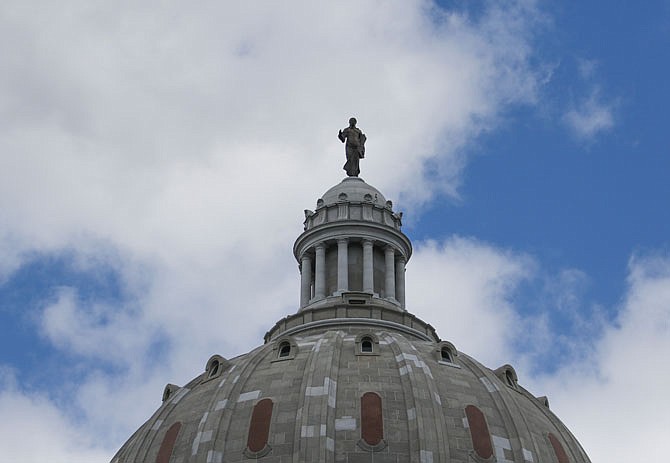It was a bipartisan Missouri Senate vote that on Friday moved the compromise bill on Gov. Mike Parson's special session anti-crime agenda to the House of Representatives, but a mostly unified vote does not mean lawmakers all share the same ideas to get at root issues of crime.
A Senate substitute for SB 1, a bill sponsored by Sen. Doug Libla, R-Poplar Bluff, passed 27-3 Friday.
The bill contains the agenda Parson called a special session for - to address a surge in violent crime in the state this year, especially in Missouri's largest cities. The bill would:
- Eliminate and prohibit the requirement for St. Louis law enforcement officers to have to live in the city, though an officer would still be required to live within an hour's response time of the city.
- Require courts to determine if a juvenile should be tried as an adult for unlawful use of a weapon and armed criminal action charges.
- Allow certain statements by witnesses to be admissible in court that would otherwise not be allowed under current law.
- Create a Pre-trial Witness Protection Fund.
- Criminalize knowingly encouraging, aiding or causing a child younger than 17 years old to engage in a weapons offense.
- Increase the penalty for a person who knowingly sells or delivers a firearm to a child without the consent of the child's parent or guardian.
Lawmakers and protesters at the Capitol in recent days have decried parts of the legislation, however - especially the juvenile certification component.
Concerns about children as young as 12 being tried as adults and Black youth being targeted did lead to a set of compromises in the Senate that included raising the minimum age for the proposed certification hearings to 14. Also, data that could show racial disparities would have to be collected and shared with courts and the Legislature.
Sen. Brian Williams, D-University City - who was still one of three Democratic votes on Friday against the compromise bill - said: "I fundamentally believe that we should be pushing our children in a direction to be successful and receive a quality education - not create mechanisms that can push them towards prison."
Better education and health care choices for communities were among alternatives to addressing crime that protesters at the Capitol last week also said need to be looked at.
Senate Minority Leader John Rizzo, D-Independence, said Friday: "This bill, and the ones that come before it, deal with crime after it happens. Until Gov. Parson and the Republican majority decide to address the root cause of crime, the chance for real change is small.
"Democrats will continue to fight for expanding mental health services, ramping up job training in underserved communities, helping more young people graduate high school prepared for a career or college, improving police and community relations through sensible reforms."
Sen. Mike Bernskoetter, R-Jefferson City, told the News Tribune later on Friday: "We're always looking for ways to improve education."
Bernskoetter added: "I'm all for helping kids, if they want to better themselves and get a good education and health care."
Senate Majority Leader Caleb Rowden, R-Columbia, on Friday noted addressing crime is an ongoing issues.
"We know that violent crime exists. We're not naive to the realities of what happens in some of our metropolitan areas, and the quicker you can get past the rhetoric and get to the substantive conversations about how we can really dive under the root causes - and try to get at those root causes - I think the better off we are.
"While this legislation might not be, for lack of a better word, the sexiest thing that we could do, I do think it is incredibly functional in finding and understanding what some problems are and addressing them with solutions that we think are going to be functional," Rowden said.
The crime bill is headed into House committee hearings Monday before a likely vote on the House floor later this week.
Rep. Rudy Veit, R-Wardsville, said Friday that while he had not yet seen what the Senate had produced, "everything I've seen preliminarily, I agree with."
Veit said he was not opposed to raising the proposed juvenile certification age to 14, except for in heinous cases - otherwise, "They don't qualify as an adult, in my humble opinion."
He also said it's a "pretty drastic" measure and "not very beneficial" to society to lock up a 13-year-old for life.
As for getting at the root causes of crime, Veit said that is something that needs to be done so juveniles don't get into bad situations.
He did not know what the House's approach would be with the Senate's bill, but he said he knew of the effort that the Senate had put into it. It may not make everyone completely happy, Veit said, but people can agree on it probably without many changes.
On the other hand, Rep. Dave Griffith, R-Jefferson City, said on Friday that while he also had not yet seen the bill the Senate produced, "I think there's going to be more debate," though the Senate's compromises may have addressed some desired changes.
Griffith said getting to the deeper causes of crime will have to be taken up in full session.
"It's going to take more than just three or four days to be able to discuss that," Griffith said.

